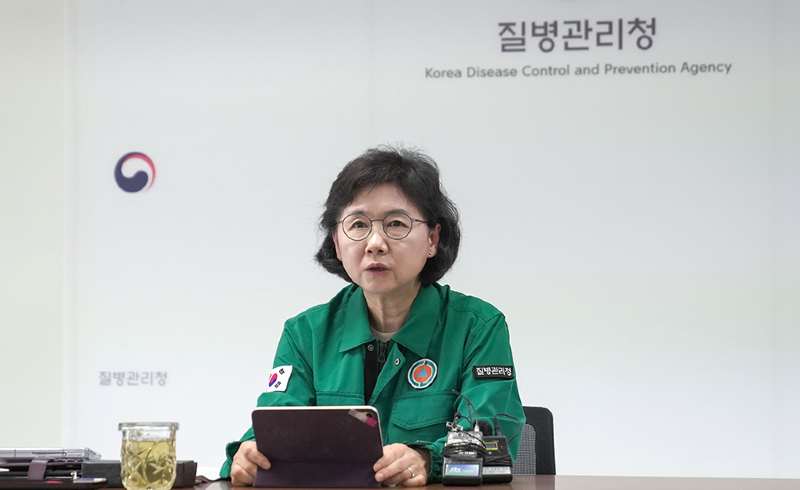Information Center
- Main page
- Information Center
- Government News
Government News
- Source
- KOREA.net
- Date
- 2024.09.03

The Korea Disease Control and Prevention Agency (KDCA) on Sept. 1 said it identified the regulation process of the immune response of an mRNA vaccine for COVID-19. Shown is KDCA Commissioner Jee Youngmee on Aug. 28 chairing a meeting of relevant ministries on coronavirus trends and responses at her agency's Seoul response center in Seoul's Seodaemun-gu District. (KDCA)
By Yoon Sojung
The Korea Disease Control and Prevention Agency (KDCA) on Sept. 1 identified the regulation process of immune response of a messenger RNA (mRNA) vaccine for COVID-19 in the injected part of the body.
The Korea National Institute of Health (KNIH) under the KDCA discovered a mechanism that boosts the early stage of immune response of such a vaccine in the injected part of the body. The result of the study was published in the Aug. 27 edition of the global academic journal Nature Communications.
Based on tests on lab mice, the research showed how mRNA vaccines develop immune-boosting effects in the early stage of vaccination by isolating and analyzing cells of muscle tissues of the injected part of the body.
The study was jointly conducted by the division of infectious disease vaccine research under the Center for Vaccine Research under the KNIH and a research team led by professor Park Jong-Eun from the Korea Advanced Institute of Science and Technology.
The COVID-19 pandemic proved mRNA vaccine technology's world-leading status as a valuable source of responses to contagious diseases in a relatively short period. Studies are also underway on using mRNA as a treatment strategy to develop cancer vaccines.
The KDCA said deeper understanding of the immunization mechanism of mRNA vaccines in the early stage is essential to develop safer and more effective vaccines.
mRNA vaccines consist of mRNA molecules and lipid nanoparticles surrounding them. In this study, researchers confirmed that the nanoparticles raised the expression of inflammatory cytokines and chemokine genes in the injected part of the body, which raises the immunization effect in the early stage.
The injected mRNA molecules in the body were found to help activate migratory dendritic cells in the injection site through expression of interferon beta genes, thus raising the cellular immune response caused by the vaccine.
The KDCA hailed this study for raising understanding of early immune response pathways and mechanisms activated by the mRNA molecules and lipid nanoparticles.
KDCA Commissioner Jee Youngmee said, "Based on studies of mRNA vaccine mechanisms, we will strive to develop mRNA-platform treatment vaccines customized for patients and commercialize effective next-generation vaccine technology."
arete@korea.kr